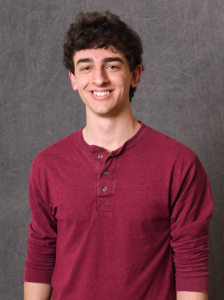Odyssey of an Inquisitive Mind

Chemistry major Jonathan Palmer, one of NC State’s 2020 Goldwater Scholars, says his ambition to do solar-energy research stems from an unlikely source: the time he spent in high school helping 10-year-olds figure out how to make towers out of balsa wood.
“My family ran a summer camp
that prepared kids for Odyssey of the Mind, a national creative problem-solving
competition,” Palmer explains. “I helped these kids figure out how to approach
solving a predefined scientific problem, like designing and building a balsa-wood
tower that could support a maximized weight load. I started to wonder: How is
it possible that you could build a balsa-wood tower that can hold 50 times its
weight? That’s what got me thinking about doing research in the physical
sciences.”
Working at the Molecular Scale
When the time came to make
decisions about college, Palmer still wasn’t sure what kind of research he
wanted to pursue.
“For each school I got into, I looked
at the research in their chemistry department to see if anything interested me,”
he says. “I knew I wanted to work in the physical sciences, and I picked
chemistry because I was interested in the molecular scale. To explore how those
balsa-wood towers worked, for instance, I could have gotten into physics; but I
chose chemistry instead because I was more interested in the underlying
molecular behavior that would explain those macroscopic processes.”

When Palmer was accepted to NC State, he looked at the research of Phil Castellano, Goodnight Innovation Distinguished Chair in the College of Sciences, and became highly interested in Castellano’s work on solar energy conversion. Palmer met with Castellano to discuss his research, and that’s what sealed the deal.
“I picked State because of the impressive research conducted by the chemistry department as a whole, but mostly because of the work Dr. Castellano was doing,” Palmer says. “When I got to NC State my freshman year, I met with him, and right away I knew he was the person I wanted to work for. I really liked him and the dynamic of his research group, as well as what he’s working on. It’s very theoretical, but it’s also very practical. I like being able to take our research and apply it to a real-world problem.”
Tackling a Global Crisis
The problem he’s chosen to work
on is modern society’s insatiable hunger for energy, most of which comes from
various forms of hydrocarbons in the ground — a finite, nonrenewable resource.
“I’m tackling the global energy crisis
through solar energy conversion and storage,” Palmer says. He works on creating
photoactive molecules that absorb light from the sun and then undergo chemical
reactions that allow them to convert that light into usable energy. The difficulty,
however, is that most of the photoactive materials in use right now are made from
precious metals such as platinum, palladium, rhenium, iridium and ruthenium —
none of them abundant, and all of them expensive.
“My goal is to use more earth-abundant materials to create molecules that can undergo the same photoreactive processes with similar or better efficiencies at a much lower cost,” he says. Palmer’s research along these lines focuses on the use of organic materials, such as carbon, sulfur and nitrogen.
“Those are some of the most
abundant elements on earth,” he notes. “From just those three elements you can
make an astounding variety of photoactive materials, but people haven’t been
investigating them as much.”
His biggest research project involves
using an organic material that’s largely sulfur-based to absorb visible light
and store it in a long-lived excited state, which allows the material to
interact with other molecules before the excited state comes to an end through
heat loss.
“I’ve learned a tremendous
amount from the research I’ve done since I got here,” Palmer says. “The
chemistry department at NC State is really open to teaching undergrads how to
do research and letting them participate.”
The strength of Palmer’s research experience is one of the reasons he won a 2020 Goldwater Scholarship, awarded to college students who intend to pursue research careers in science, mathematics or engineering. The highly competitive scholarship provides up to $7,500 per academic year to cover tuition, fees, books, food and housing.
Palmer is also a recipient of the G. Howard Satterfield Scholarship, which is awarded to outstanding undergraduates in the Department of Chemistry.
In addition to classes and research, Palmer says he enjoys participating in outreach and educational activities as a member of chemistry fraternity Alpha Chi Sigma.
“A local scout troop comes by
once a year and gets their science badge by taking demonstration science
classes from us,” he says. “We try to inspire children to look at problems and
solve them in a scientific way. They have a lot of fun. We also go to a local
middle school and talk to kids there about science, and we mentor incoming
freshmen chemistry majors.”
Palmer’s still a junior, but he
already knows that after graduation he wants to go on to grad school and get a
Ph.D. in physical chemistry, so he can eventually become a professor and
continue conducting research in solar energy conversion and storage.
“I want to keep mentoring
students, too,” he says, which only seems fitting — since that’s where this all
started for him.
This post was originally published in NC State News.